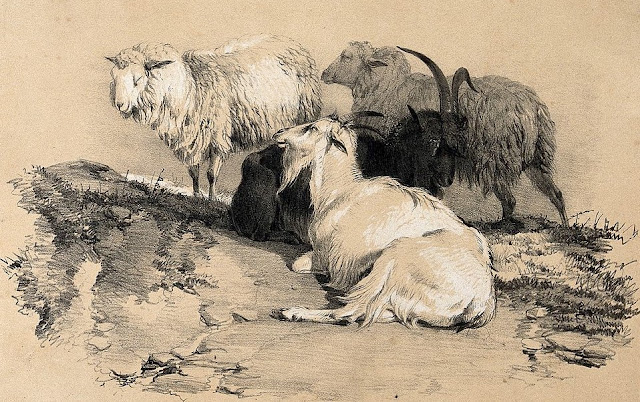Are all forgiven?
But how can it be said that God has forgiven those who have not repented - not turned to him in faith? Doesn't the idea of universal reconciliation conflict with Jesus' words in Matthew 25?
31 "When the Son of Man comes in his glory, and all the angels with him, he will sit on his throne in heavenly glory. 32 All the nations will be gathered before him, and he will separate the people one from another as a shepherd separates the sheep from the goats. 33 He will put the sheep on his right and the goats on his left. 34 Then the King will say to those on his right, 'Come, you who are blessed by my Father; take your inheritance, the kingdom prepared for you since the creation of the world.' ...41 Then he will say to those on his left, 'Depart from me, you who are cursed, into the eternal fire prepared for the devil and his angels.'"
 |
| Sheep and Goats (public domain via Wikimedia Commons) |
Here Jesus apparently refers to his return in glory (his "second coming") on that "Great Day" (Acts 2:20, Jude 1:6) when all will be judged. Jesus seems to refer to that time in John chapter 5.
26 "For as the Father has life in himself, so he has granted the Son to have life in himself. 27 And he has given him authority to judge because he is the Son of Man. 28 Do not be amazed at this, for a time is coming when all who are in their graves will hear his voice 29 and come out-- those who have done good will rise to live, and those who have done evil will rise to be condemned.""Rise to be condemned" in v29 is taken from Daniel 12:2. In the KJV, this phrase is translated, "the resurrection of damnation." Damnation" is "krisis" in Greek, a word that carries the meaning of judgment, decision and evaluation, and that speaks of discernment and the sentencing/separation that flows from it. As noted by Bultmann, the final judgment will be a time when "men divide themselves into those who accept Christ and those who reject him" (quoted in BAGH, p453). This rejection and its consequences is what Jesus points to in John 3:18.
What we learn from these and other scriptures (like Acts 24:15), is that at the time of this judgment, all people will stand before Jesus and see him for who he is - the judge who is the savior of all. This revelation will call forth the ultimate "decision." What decision? Whether or not to trust Jesus to be who he is (both judge and savior) and whether or not to embrace their true identity in him as dearly loved, accepted, included and forgiven children of God. Seeing Jesus, and themselves this way, brings to all a "crisis" of decision. It will be a glad crisis for those who believe (the "sheep"), but a terrible one for those who do not believe (the "goats").
Does God not love these "goats"? Are they not his? Has he not sent his Son to die for them? Has he not through his Son already included them in his triune life? Yes he has. Because of a decision they made or will make? No, because of who Jesus is and what he has done for them. This is the objective truth of all humanity in Christ. However, not all believe and thus experience this truth. Jesus never forces it on anyone - he will not coerce anyone now nor when he returns. Yet, he gives each person meaningful, unimpeded opportunity to "see" him and in seeing to choose. This is his gift of revelation and freedom - both expressions of God's love. However, their choice neither makes them a beloved child of God, or removes them from being one. This status is theirs only by God's gracious action in Jesus on their behalf.
Note, however, that their choice does have bearing on their experience of and thus enjoyment (or rejection) of their true identity. The final/ultimate "place" of this enjoyment is heaven; the final/ultimate "place" of this rejection is hell.
Scripture reassures us that a time is coming when all will "see" Jesus, and in "seeing" will understand (perhaps for the first time) who they are in him. Thus no one will end up in hell by "falling through the cracks" of ignorance. Jesus will see to that. But the question is this: What will they decide about Jesus, now clearly seen? We'll see, but our hope and prayer (joining with Jesus in his prayer for all), is that they will embrace their true life, now "hidden in Christ," but on that Great Day seen with clarity. In the meantime, we are called to tell people who Jesus is and who they are in him, even as we continue to pray, "Come, Lord Jesus."